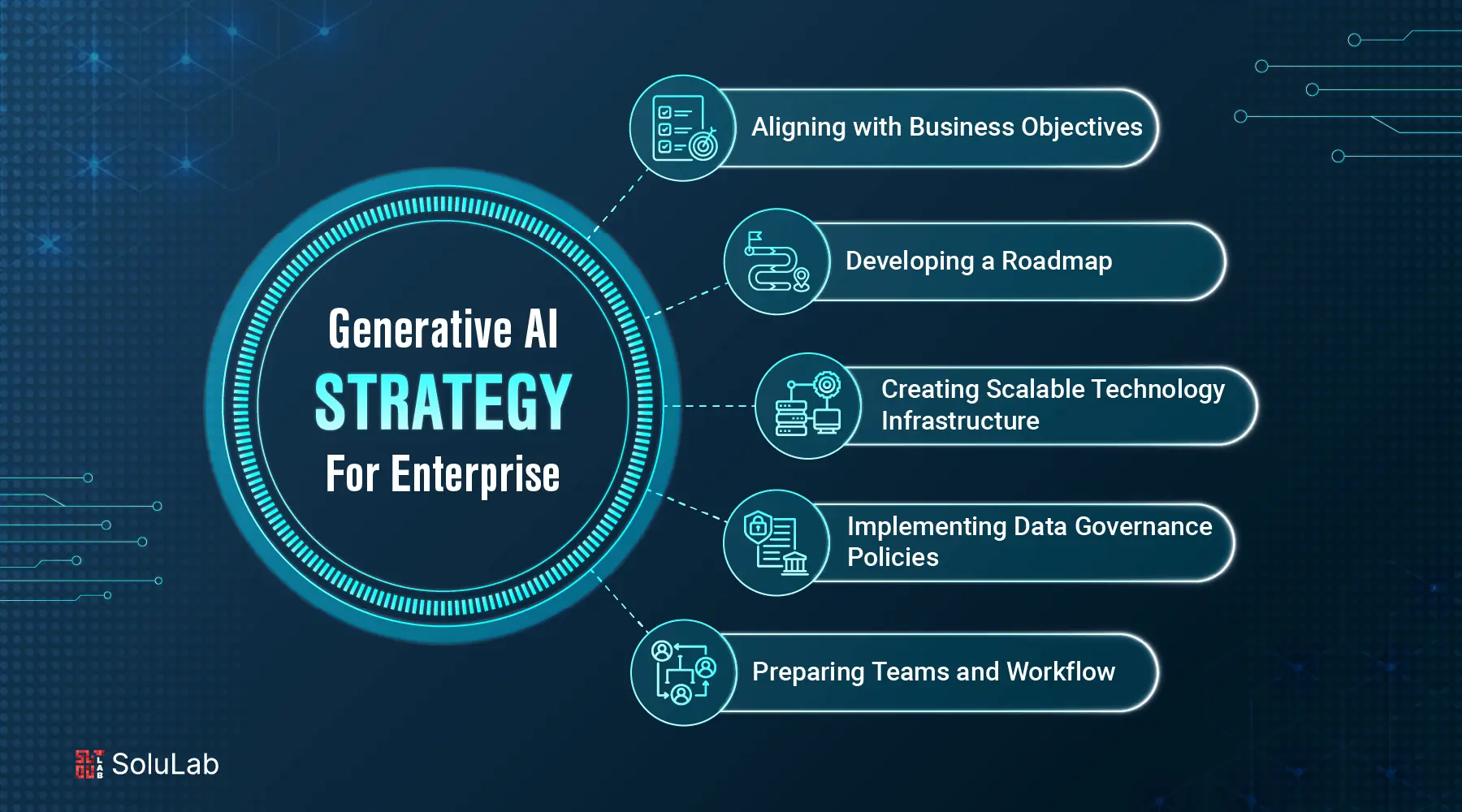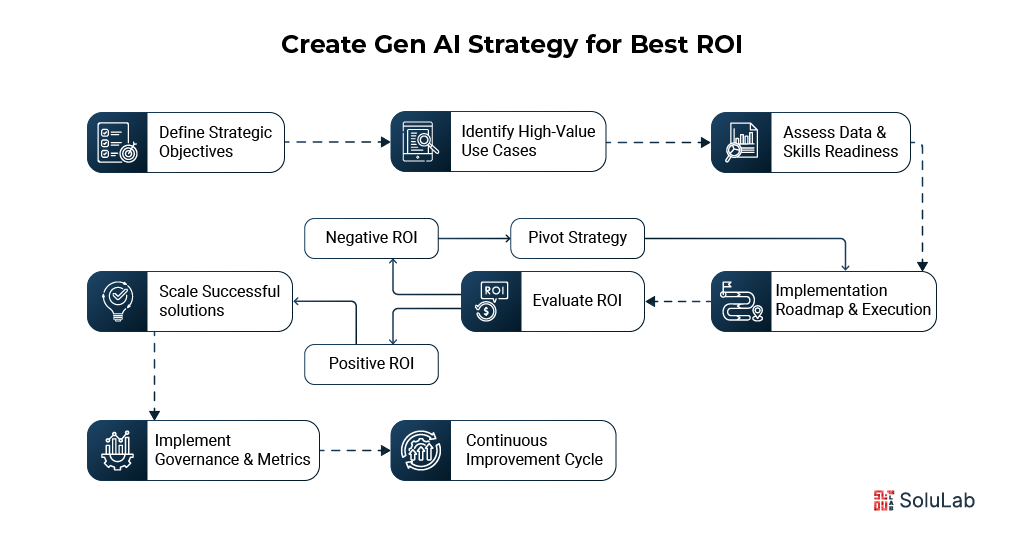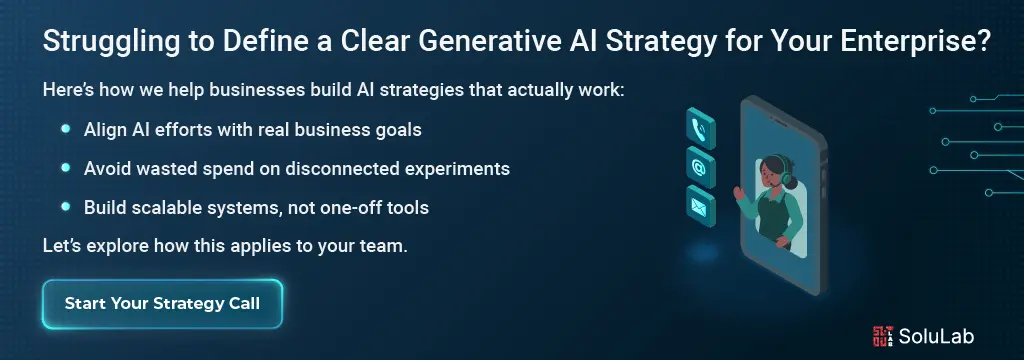
AI is changing how companies work, no doubt about it. From writing content to analyzing data, it’s popping up everywhere. According to reports, the global market for generative AI could hit nearly $38 billion in 2025, and that number might cross $1 trillion by 2034. That’s a huge leap.
However, adopting AI tools alone doesn’t ensure success. Without a well-structured strategy in place, many companies fall short of leveraging their full potential. A truly effective generative AI strategy must go beyond technology should integrate seamlessly with core business goals and processes.
In this blog, we’ll look at how powerful AI strategy consulting can optimize operations, enhance customer engagement, and create pathways for sustainable growth. Let’s start!
What is Generative AI Strategy?
A generative AI approach requires more than just choosing tools. It’s a methodical technique that blends technology capabilities with business goals to provide demonstrable results. The following are the basic components that constitute a viable strategic AI application for enterprises:
-
Aligning with Business Objectives
The first step is to understand how AI may actively help achieve your strategic objectives. Businesses may ensure their AI projects are focused on results rather than technology by finding areas where generative AI might expedite processes, decrease costs, or open up new service channels.
-
Developing a Roadmap
It is critical to assess your present data environment and analytics capabilities. Based on this evaluation, a full implementation strategy may be created, detailing precise milestones, resourcing, and integration methods for gradually improving your AI maturity level.
-
Creating Scalable Technology Infrastructure
An AI approach should not be simply dependent on implementing the most recent technologies. Instead, the emphasis should be on developing a scalable, flexible architecture that can grow with the company’s demands —whether it’s leveraging AI voice capabilities for enhanced user interaction or combining cloud platforms, APIs, and strong backend support to handle AI workloads effectively.
-
Implementing Data Governance Policies
Data quality, security, and compliance are indisputable requirements. Implementing governance frameworks helps to reduce the risks associated with AI systems while also ensuring that your organization satisfies legal standards for data protection and ethical use.
-
Preparing Teams and Workflow
To succeed with any AI endeavor, humans must be prepared. This involves restructuring positions, enhancing staff skills, and incorporating ethical awareness into everyday operations. A plan should assist change management and knowledge growth within the company.
Why Do Enterprises Need Generative AI Strategy Consulting?
As generative AI increasingly becomes essential to corporate operations, firms must implement it with careful consideration. Many companies look for professional advice to help them negotiate the procedure and guarantee they maximize the benefits of artificial intelligence. Consequently, several enterprises seek gen AI consulting to assist them in navigating the process and maximizing the value.
1. To Focus on Real Business Needs
Instead of engaging in AI experimentation for its own sake, firms should first identify areas where AI may provide tangible benefits. Consultants analyze all aspects of the organization to identify opportunities where AI might provide value. They ensure that companies concentrate on sectors where AI can have the most significant influence.
2. Aligning AI With Business Goals
An effective plan ensures that AI initiatives align with the company’s long-term objectives. Gen AI Consultants assist firms in ensuring that initiatives are integrated with fundamental business objectives such as cost reduction, market expansion, etc.
3. Develop Scalable AI Systems
Initiating with modest AI initiatives is prudent, although the true potential emerges when systems possess scalability. Consultants assist firms in developing AI solutions that can scale according to their needs, managing increased data and user capacity without necessitating frequent upgrades or modifications.
4. Organize Data for AI Efficiency
AI relies on quality data. However, several firms encounter challenges with inaccurate data or disjointed systems. Consultants assist enterprises in organizing their data, advising on methods to refine or consolidate existing systems, so guaranteeing that AI initiatives are built on a robust basis.
5. Maintain Compliance and Ethical Standards
The advancement of AI introduces novel concerns about privacy, equity, and responsibility. Consultants assist firms in navigating evolving rules and regulations, ensuring responsible AI use and mitigating any legal complications in the future.
6. Faster, Risk-Aware Implementation
In the absence of a definitive strategy, AI initiatives may experience delays, exceed budgets, or ultimately be abandoned. Consultants assist organizations in launching swiftly and effectively by using pilot programs and real-time feedback to implement early modifications, therefore conserving time and resources.
7. Prepare the Team for AI
AI tools are successful only when users are proficient in using them. An effective plan includes training and assistance for workers to ensure their readiness to engage with new AI systems, facilitating swift adaptation and integration of AI into their workflows.
5 Essential Elements of a Generative AI Strategy

Choosing the correct tools is not enough to successfully incorporate generative AI into your company. It calls for a thorough plan that complements the overarching objectives of your company. A successful generative enterprise AI strategy is built on the following five pillars, which promote innovation and long-term development.
-
Business-Driven AI Vision
A clear, business-driven vision is the foundation of any AI business plan. Prioritizing the particular results that AI can facilitate is crucial, rather than concentrating just on technical prowess. These can include improving product customization and automating processes. Organizations may make sure that AI adoption directly supports business objectives and adds value in the most relevant areas by concentrating on quantifiable business results.
-
Data Accessibility and Integration
Having access to high-quality, well-structured data is essential for a generative AI approach to be effective. In addition to being accessible, data should also be organized and prepared for system integration. Businesses may more efficiently use their current data assets by investing in data management techniques like standardization and integration, which lay the groundwork for AI models to provide insightful analysis and useful outcomes.
-
Scalable Infrastructure and Technology
Generative AI needs a strong technical foundation that can develop with the needs of the field. Scalability is crucial because AI systems need to manage ever-increasing volumes of data, enhance their models, and deploy solutions at scale. Companies should concentrate on creating adaptable infrastructures that can change to meet shifting demands, integrating cloud computing and scalable platforms that enable the unhindered expansion of AI.
-
Cross-Departmental Collaboration
A company’s operations, marketing, and customer service are all impacted by generative AI. Promoting departmental cooperation is crucial to maximizing its advantages. Establishing cross-functional teams that collaborate to find AI use cases, exchange ideas, and create a cohesive AI adoption strategy is a key component of a successful approach. This partnership ensures that AI initiatives are included in every aspect of company operations, boosting productivity and producing creative answers.
-
Quick Experiments and Agile Deployment
Environments that promote iterative development and quick testing are ideal for generative AI. Businesses may test various AI models and launch pilot projects more rapidly with an agile methodology. Organizations may improve their AI apps, speed up deployment, and prevent long acceptance delays by consistently testing new use cases and getting real-time feedback. AI initiatives are kept current and in line with changing business requirements thanks to this iterative process.
How to Make a Generative AI Strategy for Best ROI?

Follow these practical guidelines to ensure your generative AI efforts translate into strong returns without wasted resources:
1. Map Out Use Cases
Begin by analyzing everyday workflows across departments, from marketing and finance to operations. Identify repetitive or content-heavy tasks that could benefit from idea generation, summarization, or automation. Prioritizing based on workflow relevance, not hype, helps reveal where AI can do real work.
2. Define Success Metrics
Clarity around what success looks like, whether that’s faster content delivery, reduced manual effort, or increased user engagement, should be baked in before implementation. Choose KPIs that are meaningful, measurable, and directly influenced by the AI solution.
3. Set a Phased Rollout Plan
Instead of trying to launch everything at once, adopt a phased strategy. Start with a pilot, test, refine, and then expand gradually across teams or regions. This approach reduces risk and ensures lessons from earlier stages improve future deployments.
4. Establish Governance
Not all models are equal, and outputs can vary greatly. Set up a governance system to evaluate and approve which models to use, how often to update them, and how to verify the accuracy and relevance of generated content or insights.
5. Estimated Budget
AI isn’t plug-and-play. Over time, user needs evolve, and models may drift. Allocate resources for ongoing tuning, fine-tuning, retraining, and feedback collection. This keeps performance sharp and ensures long-term returns stay high.
Best Practices for a Robust Generative AI Strategy
Choosing the appropriate tool is only the initial step; the true problem lies in its correct and responsible Generative AI integration. When intending to include generative AI solutions in your company’s operations, certain clearly defined procedures might facilitate the process.
1. Identify the Appropriate Task
The cornerstone of any technological endeavor is comprehending its contextual relevance. Choosing an appropriate task is crucial for generative AI solution development. In the absence of a definite objective and a strategic execution plan linked to quantifiable targets, endeavors may become disorganized and unproductive.
Retrieval-augmented generation (RAG) is a technique that connects input with the most appropriate outcomes. This method identifies relevant knowledge sources and delivers synthesis summaries, insights, or direct answers. This facilitates improved and expedited results for areas such as sales and customer service.
2. Establish a Data Governance Framework
Generative AI requires management within a robust privacy and control framework to prevent the mismanagement of internal assets or unwanted access. Establishing a framework for the utilization, dissemination, and evaluation of information is an essential prerequisite for the large-scale implementation of these technologies.
Several essential practices include:
- Manual classification to guarantee precise labeling
- Evaluation of output to verify results
- Human support for managing unforeseen inquiries
A clearly articulated human-in-the-loop paradigm enhances dependability, transparency, and ethical adherence in decision-making.
3. Initiate on a Minor Scale and Monitor
Notwithstanding the pace, generative systems continue to increase in complexity and applications. Consequently, initiating targeted tests in low-risk environments is prudent for discerning effective strategies.
This enables internal teams to become acquainted with various formats and applications. It also reveals the constraints of particular models or solutions. Despite sophisticated technology, human oversight and refinement are vital.
4. Educate and Involve All Stakeholders
Achieving alignment throughout the whole organization is essential. Adoption is effective only when all parties are aligned and comprehend the function of the new technologies.
Provide instruction on fundamental subjects like responsible technology utilization, pertinent applications by the team, and elucidation of common terminology, such as model kinds, data structures, or creative engines. Implementing a mentorship program can further support this process by pairing experienced users with newcomers, fostering continuous learning and smoother adoption across teams.
Why Invest in Professional Gen AI Strategy Consulting?
Generative AI is exciting, but without the right plan, it can also be overwhelming. Many companies jump in because they don’t want to fall behind, only to realize later they’re spending time and money with little to show for it. That’s where professional Gen AI strategy consulting can make a real difference.
Working with experts helps you cut through the noise and get focused. Instead of chasing AI trends, consultants guide you to real, practical use cases that fit your business. Another key benefit is avoiding missteps early on. Consultants bring experience from different industries, so they’ve seen what works and what doesn’t.
Data is another area where outside help pays off. Most companies aren’t fully ready for AI because their data is messy, scattered, or unstructured. A consultant will help you clean it up and get your systems aligned.
More than anything, strategy consultants connect the dots between AI and your long-term business vision. They help shape an AI business strategy that doesn’t just chase efficiency, but supports real growth, innovation, and resilience. It’s not just about having AI—it’s about knowing what to do with it.
Conclusion
Generative AI offers significant promise for enterprises; yet, its effective integration necessitates not just technology but also a well-defined strategy and implementation plan. By using the appropriate strategy, enterprises may optimize efficiencies, improve client experiences, and maintain a competitive edge.
SoluLab, the leading generative AI development company, assists enterprises at each stage of their AI progression. We collaborate with you to comprehend your distinct requirements and formulate AI solutions that enhance growth and optimize ROI. An excellent example is our collaboration with ShopSmart, wherein we assisted the retail giant in augmenting their customer experience with AI-driven customization and optimizing their inventory management, resulting in substantial operational enhancements.
FAQs
1. What are the main benefits of using Generative AI in business?
Generative AI offers businesses a wide range of benefits, from automating repetitive tasks to improving decision-making processes. It helps organizations create personalized customer experiences, generate high-quality content at scale, and make data-driven predictions with higher accuracy.
2. How can I determine if Generative AI is the right solution for my business?
Before implementing generative AI, it’s important to assess your company’s specific needs and objectives. Start by identifying areas where automation, content generation, or data analysis could add value. If your business faces challenges related to scaling, personalizing customer interactions, or processing data, generative AI could be a strategic solution. Consulting with an expert can help you evaluate your requirements and develop a tailored AI adoption plan.
3. How do I get started with Generative AI in my organization?
Starting with generative AI involves understanding your business needs and setting clear objectives. It’s essential to begin with a pilot project to test AI applications in a controlled environment. Once successful, scale up the solution across relevant departments. Working with a generative AI consulting company can provide valuable expertise to deliver maximum business impact.
4. What types of businesses can benefit most from Generative AI?
Generative AI can benefit businesses across various industries, including retail, healthcare, finance, and marketing. Companies with large volumes of data, those focused on customer personalization, or organizations looking to optimize content creation processes will find generative AI especially valuable.
5. How long does it take to implement a generative AI solution?
It depends on the complexity of your goals. Some use cases can be piloted in weeks, while larger integrations may take a few months. Strategy consulting helps you prioritize and move faster.
6. How can SoluLab help with Generative AI Strategy Consulting?
SoluLab brings deep expertise in AI development, blockchain integration, and enterprise-grade software solutions to help your business build a tailored generative AI strategy. From identifying the right use cases and choosing the best models, SoluLab ensures seamless, ethical, and ROI-driven AI adoption.






